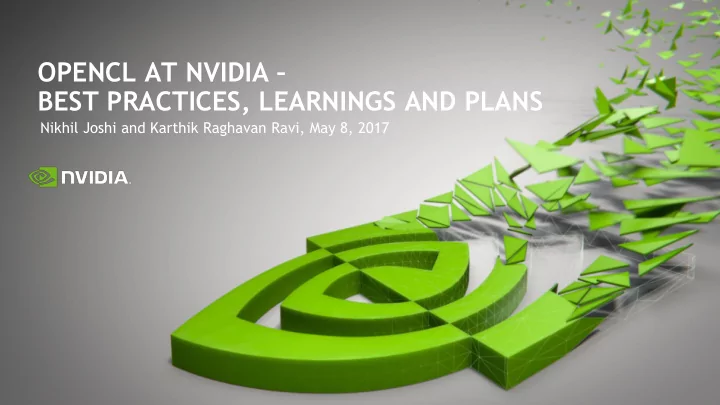

OPENCL AT NVIDIA – BEST PRACTICES, LEARNINGS AND PLANS Nikhil Joshi and Karthik Raghavan Ravi, May 8, 2017
Insights Memory management MultiGPU/multi-queue use cases Best Practices AGENDA Efficient memory management Efficient data transfers Plans/Updates New development Performance improvements 2
INSIGHTS 3
ALLOCATING MEMORY What the OpenCL spec says (and does not) CL_MEM_ALLOC_HOST_PTR “This flag specifies that the application wants the OpenCL implementation to allocate memory from host accessible memory” Spec does not specify Type of host memory (pinned vs pageable) Device accessibility (by default assumed) Memory placement (host vs device) 4
ALLOCATING MEMORY Data transfer performance characteristics Perf characteristics change based on Type of host memory (Pinned vs pageable) Size of the buffer Choice of API (Read/WriteBuffer vs Map/Unmap) 5
MEMORY MANAGEMENT NVIDIA Interpretation and Heuristics GPU friendly Memory placement close to GPU Lazy Deferred until memory are actually needed on device Host memory pinning Treats pinned memory as scarce resource Not always pinned 6
FINER CONTROL OVER MEMORY MGMT New extension (tentatively “ cl_nv_create_buffer ”) Current heuristic optimal for common GPU-bound use cases, but not all use cases For example: - Fully async copies between host and device - Sparse access from kernel New extension under preview that provides greater control over memory to better optimize for each use case. Production expected 3Q17. 7
MULTIGPU/MULTIQUEUE USE CASES Current driver tuned for single gpu, single command-queue use cases max perf, optimal latency Not optimized for MultiGPU/multi-command queue use-cases Pageable memcpy (naïve copies, very large buffers) 8
COMING UP Currently rearchitecting parts of the driver to improve performance on these scenarios, expected 3Q17 Fast paths will continue to remain the same 9
BEST PRACTICES 10
BEST PRACTICES cl_nv_create_buffer Gives all functionality of clCreateBuffer. In addition, provides knobs for memory placement [trading off access latency vs data migration cost] - close to GPU - fast access from GPU - ideal for heavy access from kernel - close to CPU - saves GPU memory and data migration cost - ideal for sparse access from kernel 11
BEST PRACTICES cl_nv_create_buffer host allocation [trading off speed vs availability] - Pinned memory - fast, async copies between GPU - this is a scarce system resource - Pageable memory - easily available - Not as fast as pinned copies 12
BEST PRACTICES cl_mem_flags & cl_map_flags Choosing cl_mem_flags and cl_map_flags appropriately can save unnecessary data movement and improve performance CL_MEM_READ_ONLY CL_MEM_WRITE_ONLY CL_MAP_WRITE_INVALIDATE_REGION 13
BEST PRACTICES Read/WriteBuffer vs Map/UnmapBuffer Prefer Map/Unmap over Read/Write Map/Unmap internally uses pinned memory Pinned memcpy bandwidth near SOL Read/WriteBuffer Perf depends on nature of host memory Pinned memory perf comparable to Map/Unmap Pageable memory bandwidth 30%-50% of pinned memcpy bandwidth *Upcoming improvements will bridge some of the gap to pinned copy performance 14
PLANS & UPDATES 15
UPDATES New development OpenCL 1.2+ preview support Upcoming cl_nv_create_buffer extension Perf improvements Improvements for multiGPU, multiple command queues use-cases Better pageable memcpy 16
OPENCL 1.2+ OpenCL 2.0 features preview, available 378+ Device-Side-Enqueues Shared Virtual Memory - Coarse Grained Buffer Generic Address Spaces 3D writes NOTE Not OpenCL 2.0 conformant 1.2+ features are experimental, not intended to be used in production 17
QUESTIONS? 18
PREVIOUS TALKS Focused on Applications “Using OpenCL for Performance -Portable, Hardware-Agnostic, Cross-Platform Video Processing” Focused on Kernel performance Focused on Kernel performance by Dennis Adams (Sony Creative Software Inc.) “Boosting Image Processing Performance in Adobe Photoshop with GPGPU Technology” by Joseph Hsieh (Adobe) 19
PREVIOUS TALKS Focused on Kernel performance “Better Than All the Rest: Finding Max -Performance GPU Kernels Using Auto- Tuning” Focused on Kernel performance Focused on Kernel performance by Cedric Nugteren (SURFsara HPC centre) “Auto -Tuning OpenCL Matrix- Multiplication: K40 versus K80” by Cedric Nugteren (SURFsara) 20
PREVIOUS TALKS Driver/Runtime performance “Performance Considerations for OpenCL on NVIDIA GPUs” by Karthik Raghavan Ravi (NVIDIA) 21
MORE OPPORTUNITIES TO DISCUSS H7109: Creating Efficient OpenCL Software [Connect With The Experts sessions] - 5/8, 1PM-2PM, Lower Level Pod B Focused on Kernel performance Focused on Kernel performance - 5/9, 4PM-5PM, Lower Level Pod C 22
Recommend
More recommend